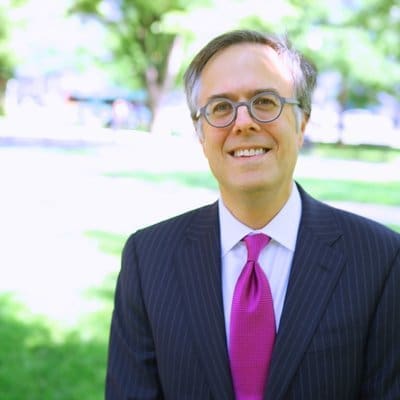It has been a strange election season in America. This will be remembered as the Twilight Zone year in which Donald Trump is the Republican front runner and got into a two-way global insult war with the pope. My intention this afternoon is to address the most extraordinary development of my political lifetime, a rising populism that could massively change conservatism in America and possibly break the Republican Party as an institution.
I could hardly speak to you at a more confusing time for an American political commentator. I have been so wrong for so long about the political appeal of Donald Trump that I am tempted to sit down now, but I will press ahead.
There is one great story on the Republican side of this election: the return of ethnonationalism to the center stage of American politics.
Many of my Republican and even Democratic friends just can’t believe that Donald Trump can possibly mean what he says. They think as Mark Twain said of Wagner’s music, that it cannot be as bad as it sounds. It must somehow be part of the show. The assumption of hidden rationality is baseless. Trump has shown a remarkable consistency in this campaign. He said he would build a wall across the continent and compel Mexico to pay for it; that he will conduct the forced expulsion of eleven million undocumented workers, which would require an immense new apparatus of enforcement and internment camps; that he would ban the immigration of Muslims to America and send Syrian refugees back into a war zone.
This is not—as many liberals in the United States try to argue—the natural outworking of conservatism. It is the corruption of conservatism. It is not the inevitable outcome of populism. It is the use of populism as a poison. This approach is closest to the type of right-wing anti-immigrant populism that we are seeing rising across Europe in Hungary, Denmark, Sweden, Poland, Greece the United Kingdom, and France.
In today’s Washington Post I call attention to the foreign policy implications of Trump’s versions of American nationalism. It’s not an easy thing to discern a foreign policy in the collective tweets of Donald Trump. But he generally views Japan, South Korea, and our European allies as freeloaders who should defend themselves or pay their own way. He believes Mexico is a scheming enemy, and he proposes a destabilizing trade war with China. He believes that Vladimir Putin should be given a free hand in the Middle East, surrendering a leading US role in the region, and he proposes fighting the war on terrorism by purposefully targeting the families of terrorists on the fear that toughness is demonstrated through war crimes. I won’t dwell on this topic; suffice it to say that Trump would be a president who cannot reliably tell the difference between America’s enemies and its friends. The world sometimes complains about American moralism, about America’s lecturing. Wait until they see the immense power of America unconstrained by the great ideals of America. On foreign policy, Trumpism is Putinism by another name. The world does not need more than one Putin, if that.
Let me focus a bit on domestic and economic policies. Some things like nativism and protectionism can’t be incorporated into a center-right party without bringing it to ruin. But conservatism is also about necessary adaptation, and the economic populism of our time has lessons to teach.
For those who criticize populist candidates, it is doubly important to understand and address the causes of popular discontent: the way of life in which increased productivity resulted in higher wages and a realistic shot at economic advancement is now fragile in some places. For many people, work is now a series of part-time, temporary, and contract jobs. The old promotion pathways are more rare; life can have instability, worry, and toxic stress at its core. The current political divide emerges from how this challenge is explained. Some argue that the old economic certainties were stolen. It may have been bankers and speculators at fault, or it may be Mexican immigrants or the Chinese, but larceny is involved. As economic analysis this is wrong or partial, but it is the political consequences that concern me.
According to Trump or Jeremy Corbyn, if our economic opportunity has been stolen, the purpose of politics is not to solve this or that problem—it is to fight and defeat enemies. This is a politics characterized by anger, retribution, and enmity. It has the chemical advantage of lighting up the limbic system, but there are many problems with it. The worst is misdiagnosis, because it undermines the possibility of productive change.
The old economic certainties have not been stolen. They have been undermined by a vast economic transmission that has placed workers in competition with talented workers around the world. This has resulted in a consistent downward pressure on wages and a ruthless demand for higher skills. This has happened at the same time that family structures, humanizing communities, and important social norms have weakened.
In the context of economic populism, conservatives who are identified with the status quo are likely to be run over. Conservatives who are a pale version of liberalism will be unnecessary. More is needed than a critique of Keynesianism—conservatives need a governing vision applying conservative and free-market ideas to the task of giving people the skills and human capital to succeed in a modern economy, a conservatism of the common good.
There should be—there can be—distinctly conservative proposals that improve skills and increase the rewards of work and encourage economic mobility; proposals to reform immigration in productive ways, make entitlements more modern and sustainable, and shape a growth-oriented tax system; proposals that provide conservative approaches to maternal and child and newborn health, and market-oriented methods to address the threat of climate disruption. A distinctly conservative vision of the common good will encourage decentralization, the strength of family and community, the importance of religious education and religious liberty, and the health of a civil society where human beings gain the values that make a life of success and meaning possible.
Others can offer anger and envy. Conservatives should be known for common purpose and respect and civic pride and voluntary associations and personal responsibility and a generous, inclusive spirit. These are not just the foundations of a free economy, they are the substance of a democratic way of life.
I’ll conclude by saying that conservatives should also be known for a passionate, moral commitment to human dignity. This is one of the great roles of religion in a democracy as one route, one basis, for personalism: the belief that everyone matters, that everyone counts, that no insignificant person was ever born. In every way that matters to God, human beings are completely equal and completely loved. They matter more than any cause; they are the cause.
Those who question the association of conservatism with this ideal haven’t been paying attention for the last three hundred years or so. It was Wilberforce’s fight for the abolition of the British slave trade and Burke’s defence of the rights of Catholics, prosecution of abuses of power in India and defence of the rights of Americans; Lincoln’s emancipation of American slaves and Lord Shaftesbury’s care for the victims of the Industrial Revolution; Churchill’s deep concern for European Jews. And yes, I am biased, but I would include the leadership of George W. Bush, who helped save so many lives from AIDS and malaria in Africa. During the twentieth century in government offices in Berlin, Moscow, and Beijing, decisions were made to take the lives of millions. I got to sit in the Oval Office and watch President Bush make decisions that saved the lives of millions through PEPFAR and the President’s Malaria Initiative and other initiatives. That was a broad bipartisan achievement across two administrations, but it began with a fully conservative belief in the priority of the person.
I suspect during the next two weeks of this campaign a lot of Republicans are preparing to identify with Dick Tuck. Tuck lost a California state senate election in 1966. In his concession speech he took the stage and said, “The people have spoken, the bastards.”
It is at moments like this that conservatives turn to history for consolation. It is the great power of historical texts that they speak to us differently in different times. We read certain speeches and documents again and again, but then in a new context, in a new light, they speak across the years as close as a voice over your shoulder.
Last night I looked at George Washington’s letter to the Hebrew congregation at Newport, Rhode Island. President Washington made a trip to Rhode Island in 1790 after it finally ratified the Constitution. Moses Seixas, the warden of the local Jewish congregation, was on the reception committee and read a letter thanking Washington for his service. Rhode Island had the new country’s largest Jewish community for a reason: because other states were not the best places to be Jewish or Quaker or Baptist or Catholic. Four days later Washington responded:
The citizens of the United States of America have a right to applaud themselves for having given to mankind examples of an enlarged and liberal policy: a policy worthy of imitation. All possess alike liberty of conscience and immunities of citizenship. It is now no more that toleration is spoken of, as if it was by the indulgence of one class of people that another enjoyed the exercise of their inherent natural rights. For happily the Government of the United States, which gives to bigotry no sanction, to persecution no assistance, requires only that they who live under its protection, should demean themselves as good citizens. . . . May the Children of the Stock of Abraham, who dwell in this land, continue to merit and enjoy the good will of the other inhabitants, while everyone shall sit under his own vine and fig tree, and there shall be none to make him afraid.
This is the proper conservative response to anger and division, a belief in inherent rights held equally by all the children of Abraham and everyone else. When my country comes back to itself, as it always does, there shall be none to make them afraid.



